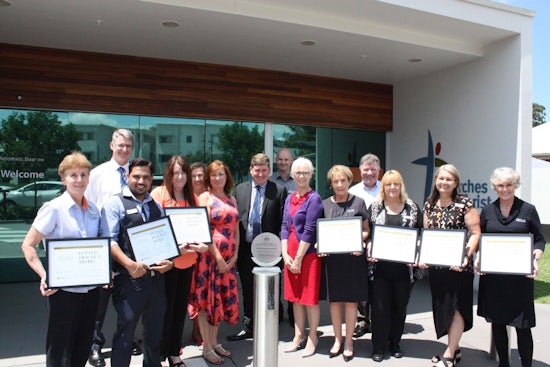Third national award for Churches of Christ Care
Queensland and Victoria operating care provider Churches of Christ Care finished 2015 on a high, with the organisation receiving three nationally recognised awards in the space of six months.

The Better Practice award was presented to Churches of Christ Care by the Australian Aged Care Quality Agency
The service provider added the Australian Aged Care Quality Agency Better Practice Award for improving wellbeing to its collection.
Earlier in the year Churches of Christ Care received the Aged and Community Services Organisation Award 2015 and the Pastoral and Spiritual Care of Older People (PASCOP) Annual Quality in Pastoral and Spiritual Practice Award.
The Better Practice award was awarded for Churches of Christ Care’s Preference Driven Care framework, which looks at personal, medical and clinical care, recognising programs, models or initiatives that showcase innovation.
The framework is part of the organisation’s Positive Wellbeing Model of Care.
“The Positive Wellbeing Model of Care was first trialled at Churches of Christ Care Moonah Park Aged Care Service before rolling out to our other services,” says Director of Seniors and Supported Living Bryan Mason.
“This model came about after we investigated ways to enhance person centred care and best practice within the secure dementia cottages at the aged care service.
“We are proud of the outcomes for our residents and will continue our focus on the importance of enabling all people to have a flourishing life and by doing so, bringing the light of Christ into our seniors communities.”
This is the third award Churches of Christ has received in the past year for its Positive Wellbeing Model of Care, which was developed after an intensive three year, self-funded study.
Clinical Practice Lead Dr Judy McCrow says that since introducing the model there have been a number of marked improvements for both residents and staff.
“Eighteen-months ago we experienced verbally and physically aggressive episodes from residents three or four times a week. Now we get one or two a month,” according to Dr McCrow.
“Past models have worked to decrease negative outcomes such as falls, aggression and depression.
“Our new model demonstrates that if everyone is happy and engaged in their lives, and experience meaningful ageing, negative outcomes are reduced,” says Dr McCrow.
Five essential needs – comfort, attachment, inclusion, occupation and identity are a focus of Churches of Christ Care’s award winning model of care. Signature programs have been developed within several different frameworks to improve the lives of clients.
“We take a constructive approach of building positive emotions to promote healthy ageing with preference-driven holistic lifestyle planning to help meet their needs,” Dr McCrow says.
A simple example of how the model differs to other methods of care is the inclusion of more information about individual resident’s desires and preferences for everyday activities.
“We used to say ‘Mrs Smith requires full assistance in the shower’. Now we include more detail about this activity based on her preferences. ‘Mrs Smith requires full assistance in the shower, but would prefer to wash her own face and hands when able’,” Dr McCrow explains.
“By embracing preferences, we can improve resident’s quality of life and help preserve their identity.”






















